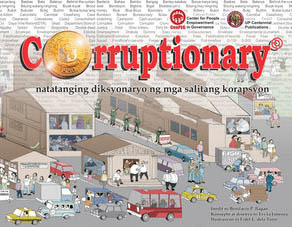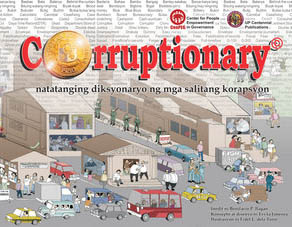By CHIT ESTELLA
 MANY Filipinos would find it hard to find a Tagalog word for “honest.” Matapat, the oft-cited word, comes closer to the English word “faithful.” Malinis is clean, which could refer to many other things. The debate goes on.
MANY Filipinos would find it hard to find a Tagalog word for “honest.” Matapat, the oft-cited word, comes closer to the English word “faithful.” Malinis is clean, which could refer to many other things. The debate goes on.
They would find it easy, however, to come up with local equivalents for the word “corrupt.” In the book, “Corruptionary: Natatanging diksyonaryo ng mga salitang korapsyon,” the authors found not one or just a few but 450 words that mean or are related to the word. The origins of the expressions, however, are not government alone but mass media as well. Corrupt practices, after all, abound not just in the bureaucracy and officialdom that journalists like to criticize but in their own industry as well.
The book is the result of a project by political science students from the University of the Philippines-Manila who were taking part in a Volunteers Integration Program at the Center for People Empowerment and Governance (CenPEG) in 2006 and 2007. What began as 100 words easily increased four-fold.
Each word or phrase has a definition, the origin of its acquired meaning, and an example of its usage. For the benefit of the non-Tagalog speaker, there is also a guide to pronunciation.
Most words or phrases are easy to understand even without their definitions. “Anak ng diyos,” for example, is understood by almost every Filipino as someone who enjoys the protection and privileges as a result of his connection with a higher official. But the development of another layer of this privileged class is wryly reflected in the newer phrase, “baby ng anak ng diyos.”
And of course, there are those expressions first heard during the NBN-ZTE hearings, such as “bubukol,” “tongpats,” and “moderate the greed.”
Every word or expression finds its roots in the Filipinos’ sense of humor. “Three Little Pigs” is the unfortunate, though funny, phrase given to the P1,000 bill, so named because of the three faces found on that denomination.
Many words are familiar, although not in the way the reader thinks they mean. “Dead,” for example does not mean end of life in this particular dictionary, but “one hundred pesos.” Unlike other words where the evolved meanings are explained, this one is not.
True to the Pinoys’ penchant for pointing out contrasts, the book observes that while there is such a thing as a “bituing may ningning” (i.e., a rich person being targeted for victimization by corrupt individuals), there is also a “bituing walang ningning” (i.e. a poor person who is probably not worth victimizing).
While the abundance of expressions relating to corruption may surprise the reader, it may be discomforting to realize that the collection is still not quite complete. Mention is made, for example, of the phrase, “crying money,” which means money for an illegal transaction. But how many know of its unmentioned twin—“smiling money”—which means money given without any expressed intention? As the authors of the book have indicated, many more contributions to this first edition are expected.
Dr. Ronnie V. Amorado, of UP Mindanao and Ateneo de Davao, whose earlier studies and books were the source of many of the words used in Corruptionary, says that corruption—and anticorruption—is “becoming a distinct subculture that contains its own set of words and codes and virtues. To understand corruption, those fighting it must know the contexts and usages of the language that has evolved over time.
Many readers would shake their heads in amusement after finishing the book. There is, however, a sense of sadness that comes with the realization that the world of corruption is one that is like to be with us for a long time—unless we find the words that will define what we want ourselves to become.
